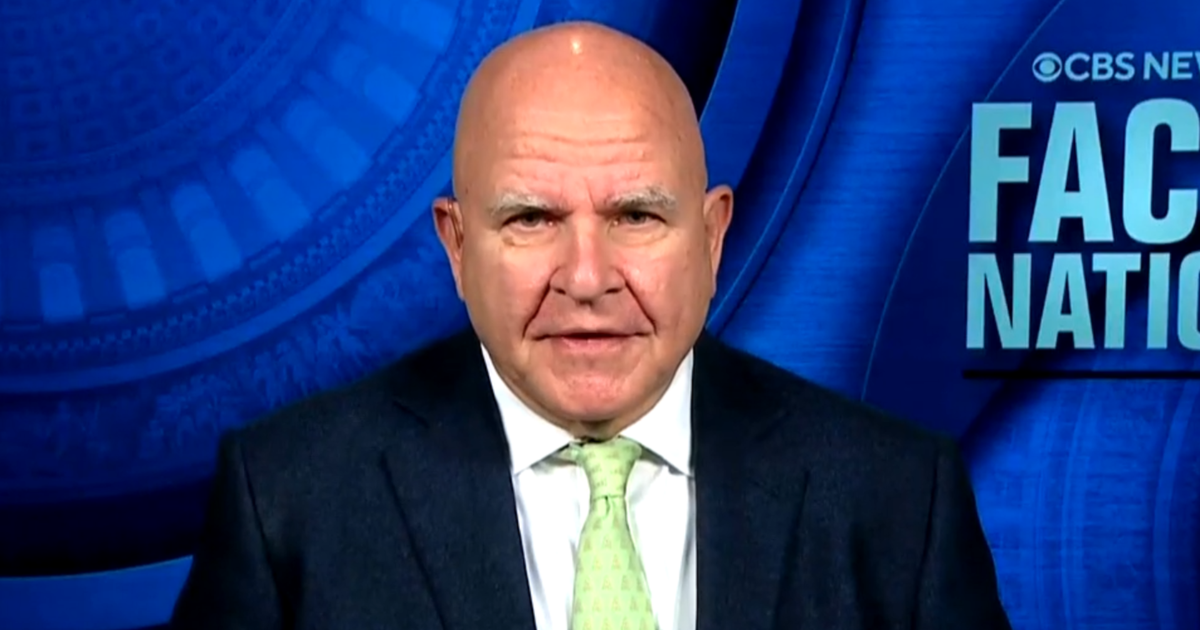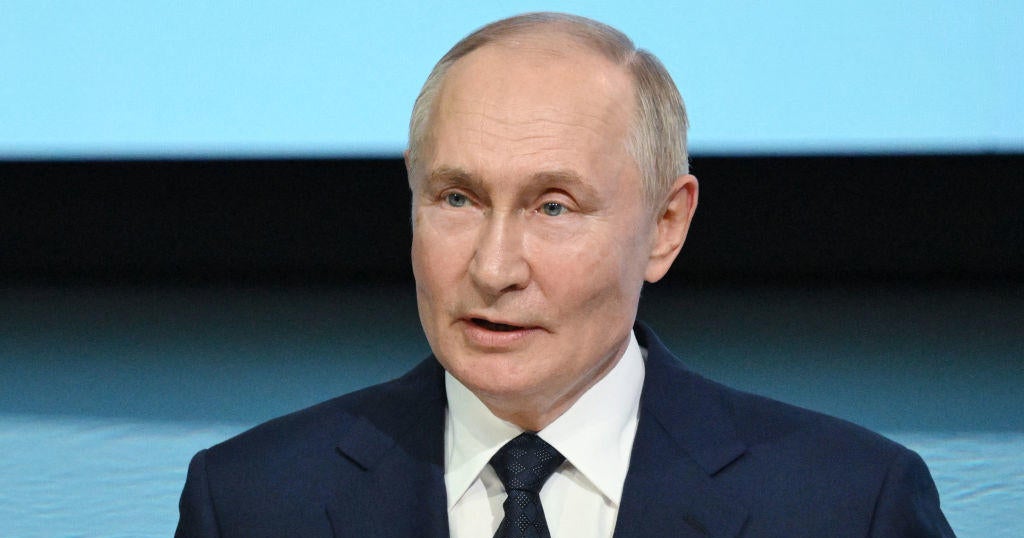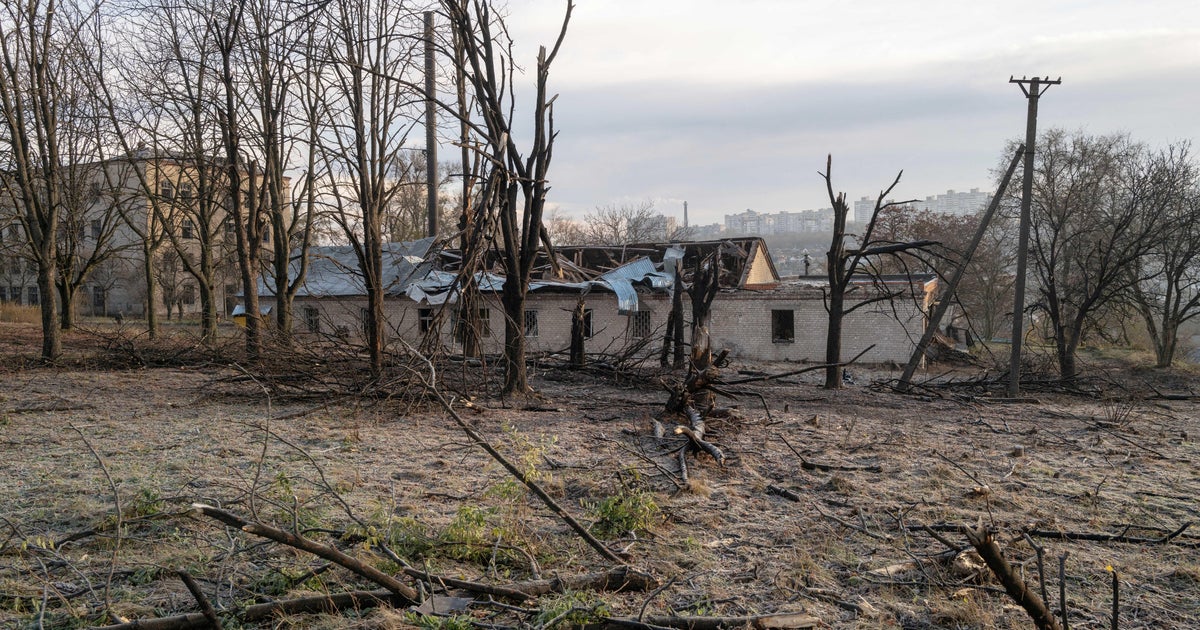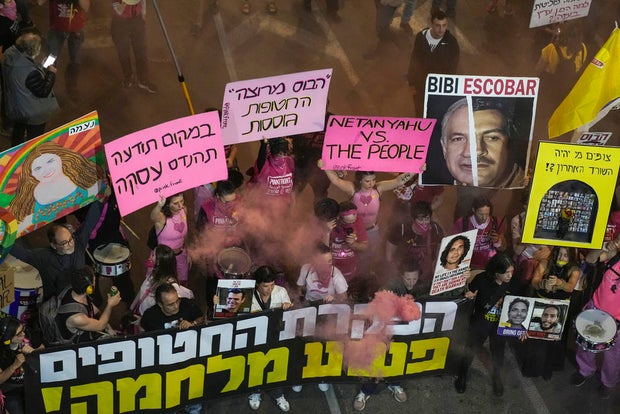CBS News
Ukraine accuses Russia of looting museums as part of heritage war | 60 Minutes

This is an updated version of a story first published on Nov. 12, 2023. The original video can be viewed here.
In October, a UN report found new evidence that Russia had committed war crimes in Ukraine with deliberate killings and widespread use of torture. But they have yet to examine the intentional destruction of cultural property, which also is a war crime. Ukraine accuses Russian forces of targeting churches, libraries, and looting the country’s most important museums. And while plunder is as old as war itself, Ukrainian investigators say this is different. They see a campaign of cultural genocide to destroy Ukraine’s identity as a nation. As we reported in November, a network of cultural warriors in Ukraine is building the case against Russia. It’s a heritage war, one told us. And we joined them on the frontlines.
Not much was left of the tiny village of Viazivka, a few hours northwest of Kyiv, after Russian forces overwhelmed the region in 2022. But we weren’t prepared for this…
Bill Whitaker: My God, so Ihor what happened here?
Ihor Poshyvailo: Liberation of Ukraine by Russian occupation forces. You see what this liberation means.
Bill Whitaker: Why would they target a church?
Ihor Poshyvailo: In this small village this was the main place. And it was targeted just to destroy what keeps the whole village and the whole community together.
60 Minutes
Ihor Poshyvailo is director of the Contemporary Maidan Museum in Kyiv. He’d brought us to see the carcass of the Church of the Nativity on Ukraine’s heritage list. Poshyvailo told us the Russians had deliberately shelled it when they retreated. There was no fighting nearby. Built in 1862, the church had survived two world wars, communism, and a revolution. but not this.
Bill Whitaker: So what message do you think the Russians were trying to send by destroying this church?
Ihor Poshyvailo: We are strong. You should be afraid of us. And we will do what we want to do. We don’t need you on this land. We don’t need your traditions, beliefs, your culture. You’ll not, you’ll not exist.
Bill Whitaker: Erase you.
Ihor Poshyvailo: Erase you, exactly.
As we sifted through the wreckage, Poshyvailo told us the church had been famous for its unique centuries-old folk art.
Bill Whitaker: And these are all paintings?
Ihor Poshyvailo: Yes, and you can see that they still have…
Bill Whitaker: Wow, look at that.
He told us this was one of 700 churches that have been hit so far. Some were collateral damage. Many were not. To document the destruction, Poshyvailo co-founded the Heritage Emergency Response Initiative, a sort of cultural SWAT team that travels to damaged sites, interviewing eyewitnesses, and saving what they can.
Ihor Poshyvailo: It’s a nightmare for me because every morning I get up and I think that’s it’s, it’s not reality, what we have and at the same time, the feelings that we will never forgive.
Bill Whitaker: Never forgive?
Ihor Poshyvailo: We will never forgive. I mean, the cultural legacy, cultural heritage, this is what makes us rich and what we have to protect and pass to future generations. That’s why I can see that it’s one of the front lines of this war. Because destroying our past, Russians tries to destroy our future.
It’s not only churches. Hundreds of museums, libraries, and monuments have been bombed, burned, or shelled. In 2022, the Russians razed this small folk museum near Kyiv to the ground. Nearby buildings were untouched. Farther east, Russian artillery destroyed this museum. Locals carried out the only surviving statue of its patron saint like a wounded patient.
Poshyvailo—and others—told us they believe it’s a strategy that comes straight from the Kremlin. For years, Russian President Vladimir Putin has publicly dismissed Ukraine’s right to exist at all. “We are all Russians,” he said. Many museum workers have been arrested—even kidnapped—by Russian soldiers.
Bill Whitaker: You don’t usually think of museum workers as being in danger.
Milena Chorna: Oh they are among the first people Russians come for.
Bill Whitaker: Why?
Milena Chorna: Well first of all, they are interested in the collections. Where did they hide the collections? Uh what is the value of the collections? And the second reason is, uh, museum workers are leaders, uh, in their community.
60 Minutes
Milena Chorna is head of international exhibits at the National War Museum in Kyiv. She helped set up a museum crisis hotline for workers in the war zone trying to save their collections. They were soon swamped with calls for help: sending money for Russian bribes, devising escape routes, hiding paintings, and sometimes just to talk.
Milena Chorna: You cut off all your emotions trying to do everything you can to help. Putting it all through yourself, it is really difficult. And at some point, you realize, yeah, that you have PTSD already, although you haven’t been to the forefront.
Milena Chorna told us many workers actually moved into their museums to help guard the collections, even as the bombs fell. In the north, during the siege of Chernihiv, she told us about one museum worker who moved in with her 8-year-old daughter. There was no electricity, no water, no heat.
Weeks later, volunteers trying to deliver a generator to the museum were killed.
Bill Whitaker: She stayed?
Milena Chorna: She stayed. She stayed until the liberation, yes. And now, she is in the army.
Bill Whitaker: What do you think of that?
Milena Chorna: I believe at some point, she might have, uh, acknowledged that, uh, what we are doing is not good enough. And at some point we will all have to become soldiers, we might all have to become soldiers.
Ukraine has accused Russia of looting more than 30 museums, calling it the biggest art theft since the Nazis in World War II. In Kherson, Russian soldiers cut paintings from frames, dragged out priceless antiques, and cleaned out more than 10,000 works of art. Even so, Chorna told us, many museum workers wouldn’t leave.
Milena Chorna: How can I leave these things to be looted or destroyed, if I know it’s the history that will last for generations?
Bill Whitaker: Can you explain that passion to me?
Milena Chorna: I might not be able to say that without emotions uh, but um um I think that um well speaking of myself uh, I understand that uh the value of these items it’s much higher than the price of my life.
Bill Whitaker: Higher than the price of your life?
Milena Chorna: Yes, yes, because the scope of affect these artifacts can have on future generations, it’s uncomparable to the scope of affect, me, myself, a single person, can do for the culture.
Chorna told us a top Russian target was Ukraine’s priceless Scythian gold collection at the Melitopol Museum. Museum workers hastily hid the treasures in cardboard boxes in the museum’s dank unfinished basement. When the Russians invaded, they wasted no time before heading to the museum, threatening to shoot the locks off the door to break in. This CCTV footage—never broadcast before—shows the Russians harassing employees, searching the museum, stashing what they took in white cloth sacks. That morning, they left without finding the gold. Undeterred, a group of soldiers turned up at the door of museum director Leila Ibrahimova and kidnapped her.
Bill Whitaker: They put a bag over your head and kidnapped you?
Leila Ibrahimova in Ukrainian (English translation): I was very scared, she told us. There were eight of them. They were wearing balaclavas and carried machine guns. One soldier did all the talking. They turned my house upside down, then they put a bag on my head and put me in a car.
Ibrahimova is in hiding so we agreed not to show her face. She told us the Russians interrogated her about the museum but she refused to cooperate. They let her go but when her name later surfaced on a Russian execution list, she fled the country.
Leila Ibrahimova in Ukrainian (English translation): My life was at risk, she told us, and staying would jeopardize my colleagues, my family. I was afraid my husband and son would be searched again.
In the end, the Russians found the gold: 198 ancient gold artifacts worth untold millions.
The Russians’ plunder has all the earmarks of a war crime, according to Vitaliy Tytych, a criminal lawyer of 30 years.
60 Minutes
He leads a new unit of the Ukrainian military investigating Russia’s targeting of heritage sites. Intentionally looting or destroying cultural property during a war is a crime. But Tytych told us, the Russians have flipped the law on its head.
Vitaliy Tytych in Ukrainian (English translation): The Russians keep saying they’re evacuating these artifacts to safeguard them during the fighting, he told us, and they will return them when the war is over. That is a lie and we are ready to prove it.
But Tytych told us he’s under no illusions. There have only been two convictions for cultural war crimes since the law was passed in 1954.
Bill Whitaker: So Ukraine wants to prosecute Russia for war crimes. How likely do you think they will actually be prosecuted?
Vitaliy Tytych in Ukrainian (English translation): I’m worried, he told us. The International treaties to prevent war crimes have not proven effective. Nor, he said, has the international criminal court but that’s all we’ve got.
In the village of Lukashivka, outside Chernihiv, museum director Ihor Poshyvailo showed us what was left after the Russians set up a base camp inside this church, a protected architectural monument.
60 Minutes
In the battle to force the Russians out, a massive fire demolished the church’s historic frescos.
Ihor Poshyvailo: Here’s also you can see, you can see the plaster from the wall…
Bill Whitaker: You still have the cross here.
Ihor Poshyvailo: Yeah, so the the church itself had so many layers of history and culture but everything is lost now.
In the nave…this was all that was left. Ooshyvailo told us this war is about more than land.
Ihor Poshyvailo: This is a war against our historical memory, against our being Ukrainian.
Bill Whitaker: You said before against your soul.
Ihor Poshyvailo: Against, exactly, against our soul, against everything which makes us Ukrainians different from Russia. And this war has signs of being a genocide war against Ukrainian nation.
Bill Whitaker: Genocide? You consider this genocide?
Ihor Poshyvailo: Yes. Because it’s, it’s an attempt to totally destroy Ukraine and Ukrainian nation.
But it will never work, Poshyvailo told us. The more the Russians attack, the more resilient Ukrainians become. We saw proof of that at the Holy Dormition Cathedral in Kyiv. A 3D laser scanner was meticulously capturing every architectural detail so that if disaster strikes, the church can be rebuilt. It’s work that’s going on across the country, saving the cultural soul of Ukraine for future generations.
Produced by Heather Abbott. Associate producer, LaCrai Scott. Broadcast associate, Mariah B. Campbell. Edited by Craig Crawford.
CBS News
Former Israeli hostages released in truce 1 year ago call for action to release those still held

Former Israeli hostages who were freed from Hamas captivity during a week-long humanitarian pause in fighting exactly one year ago Sunday called for immediate action to secure a deal for the release of those still held.
The only truce in the ongoing Israel-Hamas war on Nov. 24, 2023 – fewer than two months after fighting began – led to the release of 80 Israelis held by militants in Gaza. They were freed in exchange for 240 Palestinians detained in Israeli jails.
Repeated efforts since then by mediators from Qatar, Egypt and the United States to secure another truce and hostage release have failed. Qatar early this month said it was suspending its mediation role until the warring sides show “seriousness.”
Mostafa Alkharouf/Anadolu via Getty Images
Gabriella Leimberg was kidnapped during the Oct. 7, 2023, Hamas attack and was released along with her daughter, Mia, and sister Clara.
“For 53 days, the one thing that kept me going is that we, the people of Israel, the Jewish people, sanctify life — we don’t leave anyone behind,” she said.
Leimberg added: “Everything has already been said and now action is required. We don’t have any more time.”
Around 100 hostages are still in Gaza, and at least a third are believed to be dead.
“I survived and I was fortunate to get my entire family back,” Leimberg said. “I want and demand this for all the families of the hostages.”
Hamas wants Israel to end the war and withdraw all troops from Gaza. Israel has offered only to pause its offensive.
The Palestinian death toll from the war surpassed 44,000 this week, according to Gaza’s Health Ministry, which does not distinguish between civilians and combatants in its count.
Maya Alleruzzo / AP
Danielle Aloni, who was kidnapped with her five-year-old daughter, Emelia, and freed after 49 days, spoke at the ceremony of the “increasing danger” those still being held face every day.
She said those still in captivity “suffer physical, sexual, and psychological abuse, their identity and dignity crushed anew each day”.
“It took the Israeli government about two months to secure a deal for me and 80 other Israeli hostages. Why is it taking over a year to reach another deal to free them from this hell?” asked Aloni, whose brother-in-law, David Cunio, and his brother, Ariel Cunio, are still being held.
She emphasized that, even though she and the other hostages gained their freedom a year ago, “we haven’t really left the tunnels,” — referring to Hamas’ underground tunnels where many of the hostages were held.
“The feeling of suffocation, the terrible humidity, the stench — these sensations still envelop us,” Aloni said.
“If people could truly understand what it means to be held in subhuman conditions in tunnels, surrounded by terrorists for 54 days — there’s no way they would allow hostages to remain there for 415 days!” said Raz Ben Ami, who was released in the deal a year ago.
Her husband, Ohad, is still among those being held.
Ben Ami called for a ceasefire to “bring back all the hostages as quickly as possible”.
CBS News
Couple charged for allegedly stealing $1 million from Lululemon in convoluted retail theft scheme

A couple from Connecticut faces charges for allegedly taking part in an intricate retail theft operation targeting the apparel company Lululemon that may have amounted to $1 million worth of stolen items, according to a criminal complaint.
The couple, Jadion Anthony Richards, 44, and Akwele Nickeisha Lawes-Richards, 45, were arrested Nov. 14 in Woodbury, Minnesota, a suburb of Minneapolis-St. Paul. Richards and Lawes-Richards have been charged with one count each of organized retail theft, which is a felony, the Ramsey County Attorney’s Office said. They are from Danbury, Connecticut.
The alleged operation impacted Lululemon stores in multiple states, including Minnesota.
“Because of the outstanding work of the Roseville Police investigators — including their new Retail Crime Unit — as well as other law enforcement agencies, these individuals accused of this massive retail theft operation have been caught,” a spokesperson for the attorney’s office said in a statement on Nov. 18. “We will do everything in our power to hold these defendants accountable and continue to work with our law enforcement partners and retail merchants to put a stop to retail theft in our community.”
Both Richards and Lawes-Richards have posted bond as of Sunday and agreed to the terms of a court-ordered conditional release, according to the county attorney. For Richards, the court had set bail at $100,000 with conditional release, including weekly check-ins, or $600,000 with unconditional release. For Lawes-Richards, bail was set at $30,000 with conditional release and weekly check-ins or $200,000 with unconditional release. They are scheduled to appear again in court Dec. 16.
Prosecutors had asked for $1 million bond to be placed on each half of the couple, the attorney’s office said.
Richards and Lawes-Richards are accused by authorities of orchestrating a convoluted retail theft scheme that dates back to at least September. Their joint arrests came one day after the couple allegedly set off store alarms while trying to leave a Lululemon in Roseville, Minnesota, and an organized retail crime investigator, identified in charging documents by the initials R.P., recognized them.
The couple were allowed to leave the Roseville store. But the investigator later told an officer who responded to the incident that Richards and Lawes-Richards were seasoned shoplifters, who apparently stole close to $5,000 worth of Lululemon items just that day and were potentially “responsible for hundreds of thousands of dollars in loss to the store across the country,” according to the complaint. That number was eventually estimated by an investigator for the brand to be even higher, with the criminal complaint placing it at as much as $1 million.
Richards and Lawes-Richards allegedly involved other individuals in their shoplifting pursuits, but none were identified by name in the complaint. Authorities said they were able to successfully pull off the thefts by distracting store employees and later committing fraudulent returns with the stolen items at different Lululemon stores.
“Between October 29, 2024 and October 30, 2024, RP documented eight theft incidents in Colorado involving Richards and Lawes-Richards and an unidentified woman,” authorities wrote in the complaint, describing an example of how the operation would allegedly unfold.
“The group worked together using specific organized retail crime tactics such as blocking and distraction of associates to commit large thefts,” the complaint said. “They selected coats and jackets and held them up as if they were looking at them in a manner that blocked the view of staff and other guests while they selected and concealed items. They removed security sensors using a tool of some sort at multiple stores.”
CBS News contacted Lululemon for comment but did not receive an immediate reply.
CBS News
Former Trump national security adviser says next couple months are “really critical” for Ukraine

Washington — Lt. Gen. H.R. McMaster, a former national security adviser to Donald Trump, said Sunday that the upcoming months will be “really critical” in determining the “next phase” of the war in Ukraine as the president-elect is expected to work to force a negotiated settlement when he enters office.
McMaster, a CBS News contributor, said on “Face the Nation with Margaret Brennan” that Russia and Ukraine are both incentivized to make “as many gains on the battlefield as they can before the new Trump administration comes in” as the two countries seek leverage in negotiations.
With an eye toward strengthening Ukraine’s standing before President-elect Donald Trump returns to office in the new year, the Biden administration agreed in recent days to provide anti-personnel land mines for use, while lifting restrictions on Ukraine’s use of U.S.-made longer range missiles to strike within Russian territory. The moves come as Ukraine marked more than 1,000 days since Russia’s invasion in February 2022.
Meanwhile, many of Trump’s key selection for top posts in his administration — Rep. Mike Waltz for national security adviser and Sens. Marco Rubio for secretary of state and JD Vance for Vice President — haven’t been supportive of providing continued assistance to Ukraine, or have advocated for a negotiated end to the war.
CBS News
McMaster said the dynamic is “a real problem” and delivers a “psychological blow to the Ukrainians.”
“Ukrainians are struggling to generate the manpower that they need and to sustain their defensive efforts, and it’s important that they get the weapons they need and the training that they need, but also they have to have the confidence that they can prevail,” he said. “And any sort of messages that we might reduce our aid are quite damaging to them from a moral perspective.”
McMaster said he’s hopeful that Trump’s picks, and the president-elect himself, will “begin to see the quite obvious connections between the war in Ukraine and this axis of aggressors that are doing everything they can to tear down the existing international order.” He cited the North Korean soldiers fighting on European soil in the first major war in Europe since World War II, the efforts China is taking to “sustain Russia’s war-making machine,” and the drones and missiles Iran has provided as part of the broader picture.
“So I think what’s happened is so many people have taken such a myopic view of Ukraine, and they’ve misunderstood Putin’s intentions and how consequential the war is to our interests across the world,” McMaster said.
On Trump’s selections for top national security and defense posts, McMaster stressed the importance of the Senate’s advice and consent role in making sure “the best people are in those positions.”
McMaster outlined that based on his experience, Trump listens to advice and learns from those around him. And he argued that the nominees for director of national intelligence and defense secretary should be asked key questions like how they will “reconcile peace through strength,” and what they think “motivates, drives and constrains” Russian President Vladimir Putin.
Trump has tapped former Rep. Tulsi Gabbard to be director of national intelligence, who has been criticized for her views on Russia and other U.S. adversaries. McMaster said Sunday that Gabbard has a “fundamental misunderstanding” about what motivates Putin.
More broadly, McMaster said he “can’t understand” the Republicans who “tend to parrot Vladimir Putin’s talking points,” saying “they’ve got to disabuse themselves of this strange affection for Vladimir Putin.”
Meanwhile, when asked about Trump’s recent selection of Sebastian Gorka as senior director for counterterrorism and deputy assistant to the president, McMaster said he doesn’t think Gorka is a good person to advise the president-elect on national security. But he noted that “the president, others who are working with him, will probably determine that pretty quickly.”















